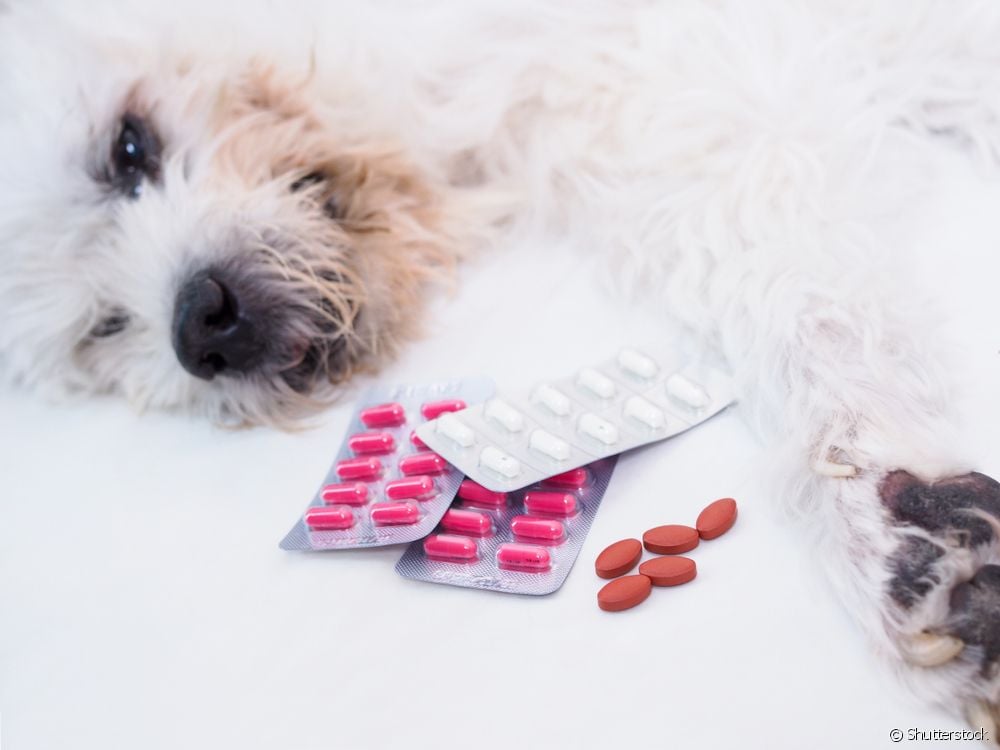"My dog ate medicine": what to do?

Table of contents
"My dog ate medicine!" When faced with this situation, it is understandable (and valid) to be very concerned. The dog intoxicated by medicines made for humans can cause serious problems to the dog's health. Just as it happens when eating food forbidden for dogs, when a dog eats contraceptive, controlled medicine or any other human medicine, it develops a conditionintoxication which, if not treated soon, can cause serious damage to his body.
But after all, if my dog has eaten medicine, what should I do immediately? Do all human medicines cause poisoning? How can we prevent this from happening? When the dog has taken medicine and then vomited, what is the recommendation? The Paws of the House explains everything about this subject so that there is no doubt about how to act in this situation. check out!
Under no circumstances may the dog take medicine from a human
The medicines we take on a daily basis do not have the same effect on dogs. In fact, most of them have the opposite effect: instead of helping, they damage their health by causing drug intoxication. The functioning of the dog's body is different from ours. The substances and hormones that make up medicines for humans can be very toxic to the animal's body. Whena dog has eaten contraceptive, anti-inflammatory, sleeping pills or any other medication, it is as if his body has been poisoned by the toxins present which, although they are good for humans, are very serious for dogs.
Moreover, in situations of "my dog has taken rivotril, dipyrone or any other medicine", it is much more common for him to eat not just one pill, but a whole carton. This excess is extremely harmful and can even lead to death. Therefore, under no circumstances can the dog take human medicine. That is why there are specific medicines for dogs.
Dog took medicine and vomited: know what are the most common signs
When the dog ingests any human medication, his body suffers from intoxication. But after all, if my dog ate birth control or any other medicine, what to do to identify it? As with ingesting any human medication, the dog will show some symptoms of a poisoned dog. Usually, the most classic sign that helps us to realize is when the doghas taken medicine and vomited, as this is a classic response of the body to the entry of a toxic substance. In addition to the dog vomiting, other common signs are:
- Diarrhea
- Nausea
- Disorientation
- Excessive salivation
- Pale gums
- Seizure in a dog
- Motor dyscoordination
Did your dog eat a contraceptive, painkiller or anti-inflammatory? First step is to identify which medicine was ingested
In order to speed up the treatment of a case of "my dog ate medicine", it is important to know exactly which medicine the animal has ingested. This information helps to understand which substance is poisoning the dog's body and what should be done to cure the animal. When you see the dog with any sign that it has ingested medicine, look for the medicine box or carton and inform theIn addition, find out how much was ingested, as this information is also crucial to define the best treatment intervention. Higher dosages are more serious and need more urgent treatment. Also pay attention to the time the dog ate the medicine. All this information is crucial to understand the severity of the condition.and how to proceed.

My dog ate medicine: what to do when seeing the dog intoxicated?
When faced with this situation, it is normal for the guardian to be very worried and desperate. But after all, if my dog ate medicine, what to do? The biggest recommendation is to take the pet immediately to the veterinarian. When the animal ingests a medicine, its body suffers an intoxication that is usually treated with a stomach wash done by a professional. So when the dog took a medicine, it wasted its stomach.medicine and vomited (or showed any other symptoms of intoxication), do not hesitate and take him to a specialist.
Many owners who catch the dog eating the medicine in the act try, by instinct, to force the animal to vomit as a way to eliminate the medication. However, when this procedure is performed in the wrong way it can end up hurting the pet. So, if you have the doubt "my dog ate medicine, what to do", the ideal is to take it to a specialist. If the induction of vomiting is reallynecessary, the veterinarian is the one who should perform it.
My dog ate medicine: how to prevent this from happening
Cases of dogs eating medicine are unfortunately more common than you might think. Because it has no taste or smell, the animal only eats a medicine because it has easy access. As they are curious and bite everything in front of them, they end up ingesting the substance and suffering the consequences. So, if you don't want to go through the situation of "my dog ate medicine", what to do to avoid it? The mostThe most important thing is to keep all medicines out of the reach of the animal. The ideal is to always store them at the top of the cabinets, preferably in zippered bags. Also, always be careful not to forget any tablets on tables, benches and chairs. Any slip can be very dangerous for the dog's health.
Another tip is training: teaching dogs not to eat everything they find on the floor is a way to avoid problems such as ingesting medicines, things they find during the walk and prohibited foods.
See_also: How many litter boxes does a cat need to have available at home?
